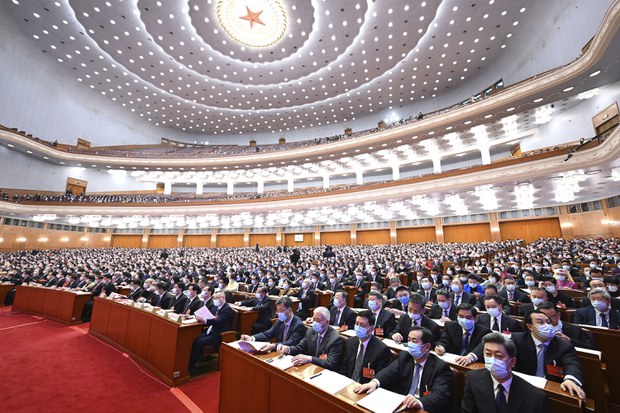Ahead of congress, police send petitioners from across China back to their hometowns
Share

Delegates attend the closing session of China’s National People’s Congress (NPC) at the Great Hall of the People in Beijing, March 11, 2022. Petitioners who have grievances against the government are being forcibly sent away from the capitol.
Chinese authorities are stepping up security measures ahead of next month’s annual parliamentary and advisory sessions in Beijing, detaining dozens of people coming to the capital with grievances and forcing them to go back home, Radio Free Asia has learned.
The moves come ahead of the country’s rubber-stamp parliament, the National People’s Congress.
More than 30 petitioners from Shanghai were detained en route to Beijing by train in recent days, a petitioner who gave only the surname Zhou for fear of reprisals said. “They have just started stability maintenance,” Zhou said. “They now need to know the whereabouts of every petitioner.”
“Anyone who goes to Beijing gets brought back – they brought back 30 to 40 people in the space of a week, because the Beijing and Tianjin police intercepted the train when it reached Beijing,” Zhou said. “They handed them straight over to the Shanghai representative office in Beijing.”
China’s army of petitioners, who flood the ruling Chinese Communist Party’s official complaints departments daily, frequently report being held in unofficial “black jails,” beaten, or otherwise harassed if they persist in a complaint beyond its initial rejection at the local level.
They are often escorted home forcibly by “interceptors” sent by their local governments to prevent negative reports from reaching the ears of higher authorities, where they face surveillance, violent treatment and possible detention on criminal charges, particularly during major political events or on dates linked to the pro-democracy movement.
The situation was also confirmed by a Beijing resident who gave only the surname Tang.
“They’ve started coming in from every locality and detaining people [from their jurisdictions],” Tang said. “They’ve already arrived from Jilin, Shenyang, Liaoning, while the ones from Ningxia started detaining people on the first and second day of Lunar New Year.”
Political machinery
The ruling Chinese Communist Party’s advisory body, the Chinese People’s Political Consultative Conference kicks off its annual session this year on March 4, closely followed by the National People’s Congress, where party leader Xi Jinping will likely be nodded through for a third term as president after abolishing term limits in 2018.
Tang, who rents out rooms to petitioners in Beijing, said police had come to her home to warn her not to do so ahead of the parliamentary sessions.
“The police came round five days ago and told me not to rent rooms to petitioners, or my ability to make a living could be affected,” she said. “More than a dozen people were taken away [on Thursday].”
“I had told 14 people they could stay with me, but they can’t now.”
Tang said the measures were part of nationwide “stability maintenance” measures aimed at nipping any possible mass gatherings or protests of those with grievances against the government in the bud.
A petitioner who gave only the surname Zhang from the central city of Wuhan said petitioners are often classified as “key” individuals by police and targeted for stability maintenance, based on how much of a threat they could pose to public order.
They then impose restrictions on them, preventing them from going to Beijing, Zhang said.
“I made a trip to [the central province of] Henan the day before yesterday,” he said. “I had been planning to continue north [to Beijing] but five individuals from my local police station contacted me by phone and asked me what I was up to in Henan.”
“They had very clear knowledge of my whereabouts and what I was doing.”
A petitioner surnamed Li said he and several others were taken away by police recently and had their retinas and voiceprints recorded on a police database.
“We were taken in specially so they could take our retina prints and our voiceprints,” Li said. “This means there’s no escaping [the authorities], wherever you go.”
“If you walk down the street, [nationwide facial recognition network] SkyNet can see where you’re going, and they can use your voiceprint [to recognize you making a call] to control you,” he said.
Translated by Luisetta Mudie. Edited by Malcolm Foster.







